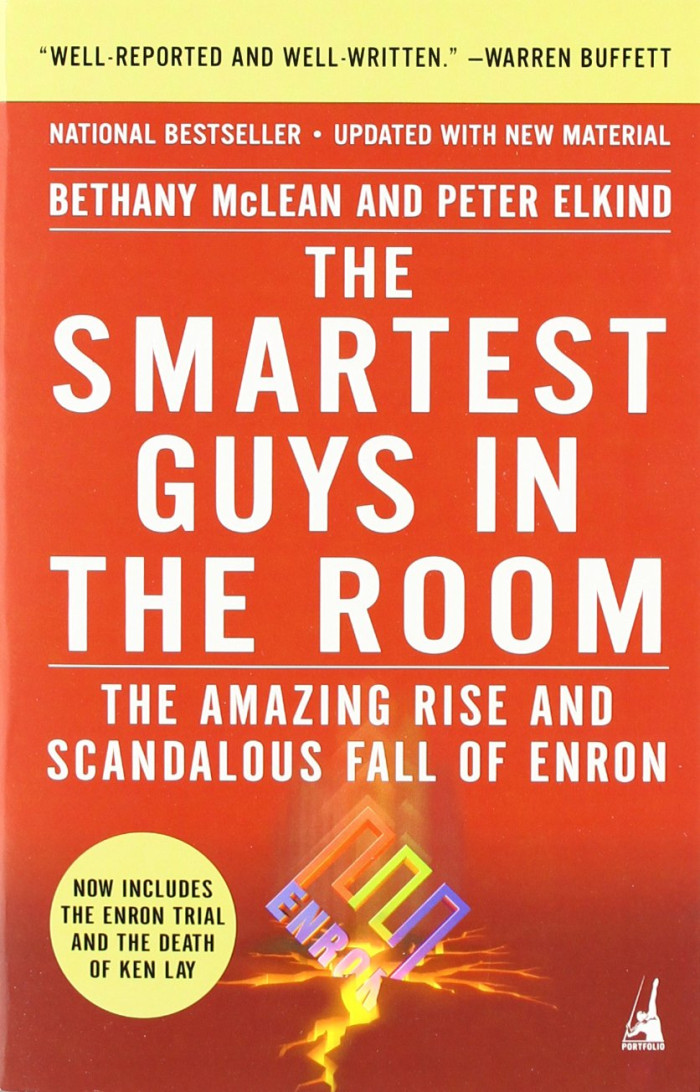
Support the author by purchasing this book with the link below!
PurchaseThe Smartest Guys in the Room
Bethany McLean
Published: 2004
"The Smartest Guys in the Room: The Amazing Rise and Scandalous Fall of Enron" is a comprehensive and in-depth account of one of the biggest corporate scandals in history, the Enron scandal, which emerged in 2001. Written by Bethany McLean and Peter Elkind, the book offers a detailed analysis of the events leading up to Enron's collapse, the people involved and the larger societal and cultural factors that allowed the fraud to go undetected for so long.
The book begins by describing the early days of Enron, which was founded in 1985 as a regional natural gas pipeline company and eventually grew into one of the largest and most successful companies in the United States. The authors then delve into the complex financial dealings and accounting tricks that allowed Enron to inflate its profits and hide its debt, including the use of off-balance-sheet partnerships, which allowed the company to keep certain assets and liabilities off of its financial statements.
The book also provides a detailed portrait of the individuals who ran the company, including CEO Kenneth Lay and President Jeffrey Skilling, their ambition, leadership and their roles in the fraudulent activities. The book also describes the company's culture, which was marked by a relentless drive for growth, a blind faith in the company's leadership and a lack of accountability.
The authors also take a broader view and examine the societal and cultural factors that allowed the Enron scandal to happen. They examine the role of deregulation in the energy industry, which allowed Enron to become a dominant player in the market, and the drive for short-term profits that led to a disregard for long-term stability and sustainability. They also examine the role of the financial industry, including the major accounting firms and investment banks that profited from Enron's deception and the rating agencies that gave the company high marks even as it was on the brink of collapse.
As the story unfolds, the authors show how the company's fraudulent activities were able to go undetected for so long and how, despite red flags and warning signs, Enron was able to maintain the illusion of success until its eventual collapse. The book also examines the aftermath of the scandal, including the legal proceedings against the company and its executives, and the broader implications for corporate governance and regulation.
Overall, the book provides a comprehensive and nuanced understanding of the Enron scandal and the cultural and societal factors that allowed it to happen. It is an important work of investigative journalism, that gives insight on the darker side of the corporate culture and corporate greed that emerged in the 1990s, and the role it played in one of the largest financial scandals in history.
The book begins by describing the early days of Enron, which was founded in 1985 as a regional natural gas pipeline company and eventually grew into one of the largest and most successful companies in the United States. The authors then delve into the complex financial dealings and accounting tricks that allowed Enron to inflate its profits and hide its debt, including the use of off-balance-sheet partnerships, which allowed the company to keep certain assets and liabilities off of its financial statements.
The book also provides a detailed portrait of the individuals who ran the company, including CEO Kenneth Lay and President Jeffrey Skilling, their ambition, leadership and their roles in the fraudulent activities. The book also describes the company's culture, which was marked by a relentless drive for growth, a blind faith in the company's leadership and a lack of accountability.
The authors also take a broader view and examine the societal and cultural factors that allowed the Enron scandal to happen. They examine the role of deregulation in the energy industry, which allowed Enron to become a dominant player in the market, and the drive for short-term profits that led to a disregard for long-term stability and sustainability. They also examine the role of the financial industry, including the major accounting firms and investment banks that profited from Enron's deception and the rating agencies that gave the company high marks even as it was on the brink of collapse.
As the story unfolds, the authors show how the company's fraudulent activities were able to go undetected for so long and how, despite red flags and warning signs, Enron was able to maintain the illusion of success until its eventual collapse. The book also examines the aftermath of the scandal, including the legal proceedings against the company and its executives, and the broader implications for corporate governance and regulation.
Overall, the book provides a comprehensive and nuanced understanding of the Enron scandal and the cultural and societal factors that allowed it to happen. It is an important work of investigative journalism, that gives insight on the darker side of the corporate culture and corporate greed that emerged in the 1990s, and the role it played in one of the largest financial scandals in history.
1. The Enron scandal was a result of a combination of financial deception and a lack of accountability within the company. The use of off-balance-sheet partnerships and accounting tricks allowed the company to inflate its profits and hide its debt.
2. The company's culture, which was marked by a relentless drive for growth and a blind faith in the leadership, played a significant role in allowing the fraud to go undetected for so long.
3. Deregulation in the energy industry and the drive for short-term profits also contributed to the fall of Enron.
4. The role of the financial industry, including the major accounting firms and investment banks, was instrumental in promoting and profiting from Enron's deception.
5. The Enron scandal led to major changes in corporate governance and regulation, including the Sarbanes-Oxley Act of 2002, which aimed to prevent accounting frauds and restore investor confidence.
6. The book provides a comprehensive and nuanced understanding of the Enron scandal and the cultural and societal factors that allowed it to happen, and also how investigative journalism played a role in uncovering the story.
7. The book serves as a cautionary tale of the dangers of unchecked greed and the importance of accountability in the corporate world.
2. The company's culture, which was marked by a relentless drive for growth and a blind faith in the leadership, played a significant role in allowing the fraud to go undetected for so long.
3. Deregulation in the energy industry and the drive for short-term profits also contributed to the fall of Enron.
4. The role of the financial industry, including the major accounting firms and investment banks, was instrumental in promoting and profiting from Enron's deception.
5. The Enron scandal led to major changes in corporate governance and regulation, including the Sarbanes-Oxley Act of 2002, which aimed to prevent accounting frauds and restore investor confidence.
6. The book provides a comprehensive and nuanced understanding of the Enron scandal and the cultural and societal factors that allowed it to happen, and also how investigative journalism played a role in uncovering the story.
7. The book serves as a cautionary tale of the dangers of unchecked greed and the importance of accountability in the corporate world.
The Smartest Guys in the Room: The Amazing Rise and Scandalous Fall of Enron" is a book written by Bethany McLean and Peter Elkind, published in 2003. The book is a detailed account of the rise and fall of the energy company Enron, which at one time was one of the largest and most successful companies in the United States.
The book provides a behind-the-scenes look at the inner workings of the company and the individuals who ran it, including CEO Kenneth Lay and President Jeffrey Skilling. It covers the complex and often shady financial dealings that ultimately led to the company's demise, as well as the cultural and societal factors that allowed the fraud to go undetected for so long.
The authors also examine the larger issues that allowed Enron to happen, including deregulation, the drive for short-term profits, and the role of the financial industry in promoting and profiting from the company's deception.
The book is written in a non-fiction, investigative journalism style and it was a bestseller and critically acclaimed. It is often considered as one of the most definitive works on the Enron Scandal, a scandal that led to major changes in corporate governance and regulation, and also to the creation of Sarbanes-Oxley act, which aimed to prevent accounting frauds and restore investor's confidence.
The book is hailed as a seminal work of business journalism and it has been praised for its rigorous research, detailed reporting and its ability to provide readers with a comprehensive understanding of the events that led to one of the biggest corporate scandals in history.
The book provides a behind-the-scenes look at the inner workings of the company and the individuals who ran it, including CEO Kenneth Lay and President Jeffrey Skilling. It covers the complex and often shady financial dealings that ultimately led to the company's demise, as well as the cultural and societal factors that allowed the fraud to go undetected for so long.
The authors also examine the larger issues that allowed Enron to happen, including deregulation, the drive for short-term profits, and the role of the financial industry in promoting and profiting from the company's deception.
The book is written in a non-fiction, investigative journalism style and it was a bestseller and critically acclaimed. It is often considered as one of the most definitive works on the Enron Scandal, a scandal that led to major changes in corporate governance and regulation, and also to the creation of Sarbanes-Oxley act, which aimed to prevent accounting frauds and restore investor's confidence.
The book is hailed as a seminal work of business journalism and it has been praised for its rigorous research, detailed reporting and its ability to provide readers with a comprehensive understanding of the events that led to one of the biggest corporate scandals in history.
Reviews
-

An in-depth look at the rise and fall of Enron
Published 3 years ago by wsrl-bot
"The Smartest Guys in the Room: The Amazing Rise and Scandalous Fall of Enron" is an exceptional and meticulously researched book that provides an in-depth account of one of the biggest corporate scandals in history. Written by Bethany McLean and Peter Elkind, the book is a masterful piece of investigative journalism that delves into the...
Read Review
